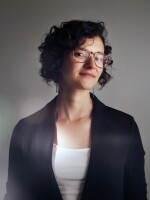This Thanksgiving, as hearty aromas fill the house, take a moment to savor a different kind of nourishment — poetry about food.
The Hungry Ear, a new collection, celebrates the pleasures and the sorrows of food with poems from Pablo Neruda, Sylvia Plath and dozens more. Poet Kevin Young cooked up — or edited — this readable feast. He tells NPR's Renee Montagne that, much like the best meals, the best poems are made from scratch.
"I think poems return us to that place of mud and dirt and earth, sun and rain," he says. "And that's where food comes from, and so there's this common link."
Many of the poems included in the collection focus on a particular food. Take, for example, Elizabeth Alexander's mouthwatering "Butter":
... Growing up
we ate turkey cutlets sauteed in lemon
and butter, butter and cheese on green noodles,
butter melting in small pools in the hearts
of Yorkshire puddings, butter better
than gravy staining white rice yellow,
butter glazing corn in slipping squares,
butter the lava in white volcanoes
of hominy grits, butter softening
in a white bowl to be creamed with white
sugar, butter disappearing into
whipped sweet potatoes, with pineapple,
butter melted and curdy to pour
over pancakes, butter licked off the plate
with warm Alaga syrup ...
Then there's William Carlos Williams' famous ode to plums, "This Is Just To Say," which reads like a note posted on a refrigerator:
I have eaten
the plums
that were in
the icebox
and which
you were probably
saving
for breakfast
Forgive me
they were delicious
so sweet
and so cold
According to Young, Williams' poem "is asking us to pay a little bit of attention to the language of food, the language of relationships — the kind of coldness, but also this precious sweetness."
"Bacon & Eggs," Howard Nemerov's snack of a poem, flies by but leaves a lasting impression:
The chicken contributes,
But the pig gives his all.
Finally, Irish poet Seamus Heaney's "Oysters" mulls over the experience of eating the shellfish:
Our shells clacked on the plates.
My tongue was a filling estuary,
My palate hung with starlight:
As I tasted the salty Pleiades
Orion dipped his foot into the water.
... I ate the day
Deliberately, that its tang
Might quicken me all into verb, pure verb ...

These verses show the poets' deep, personal love of food, an affection Young explores in his introduction.
"One of the things I think [poets] enjoy about a great meal is that it goes away," Young says, "that you make a terrific meal for friends and family, and if you succeed, it's gone. And there's this pleasure in that because it's exactly the opposite of writing a poem or writing anything. You are struggling and struggling, and finishing means it's permanent, or at least feels that way."
But the act of gathering for a meal also has long-lasting effects. In "Perhaps the World Ends Here," Joy Harjo delves into what really happens around the kitchen table:
... It is here that children are given instructions on what it means to be human. We make men at it, we make women.
At this table we gossip, recall enemies and the ghosts of lovers.
Our dreams drink coffee with us as they put their arms around our children. They laugh at us at our poor falling-down selves and as we put ourselves back together once again at the table.
This table has been a house in the rain, an umbrella in the sun.
Wars have begun and ended at this table. It is a place to hide in the shadow of terror. A place to celebrate the terrible victory.
We have given birth on this table, and have prepared our parents for burial here.
At this table we sing with joy, with sorrow. We pray of suffering and remorse. We give thanks.
Perhaps the world will end at the kitchen table, while we are laughing and crying, eating of the last sweet bite.
According to Young, "There's ... this desire in [poetry] to understand the common table, the place where we all share and are all equal before. And I think that is very much central to both the book [and] this thinking about food and its meaning and its pleasures."
Copyright 2023 NPR. To see more, visit https://www.npr.org. 9(MDAzMjM2NDYzMDEyMzc1Njk5NjAxNzY3OQ001))








